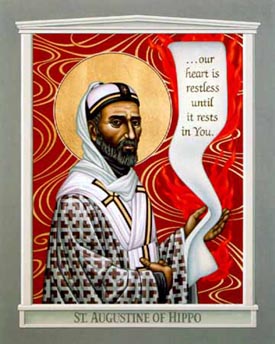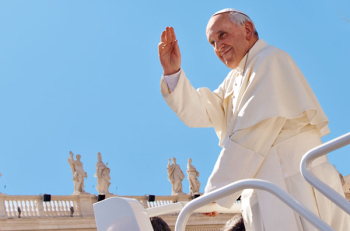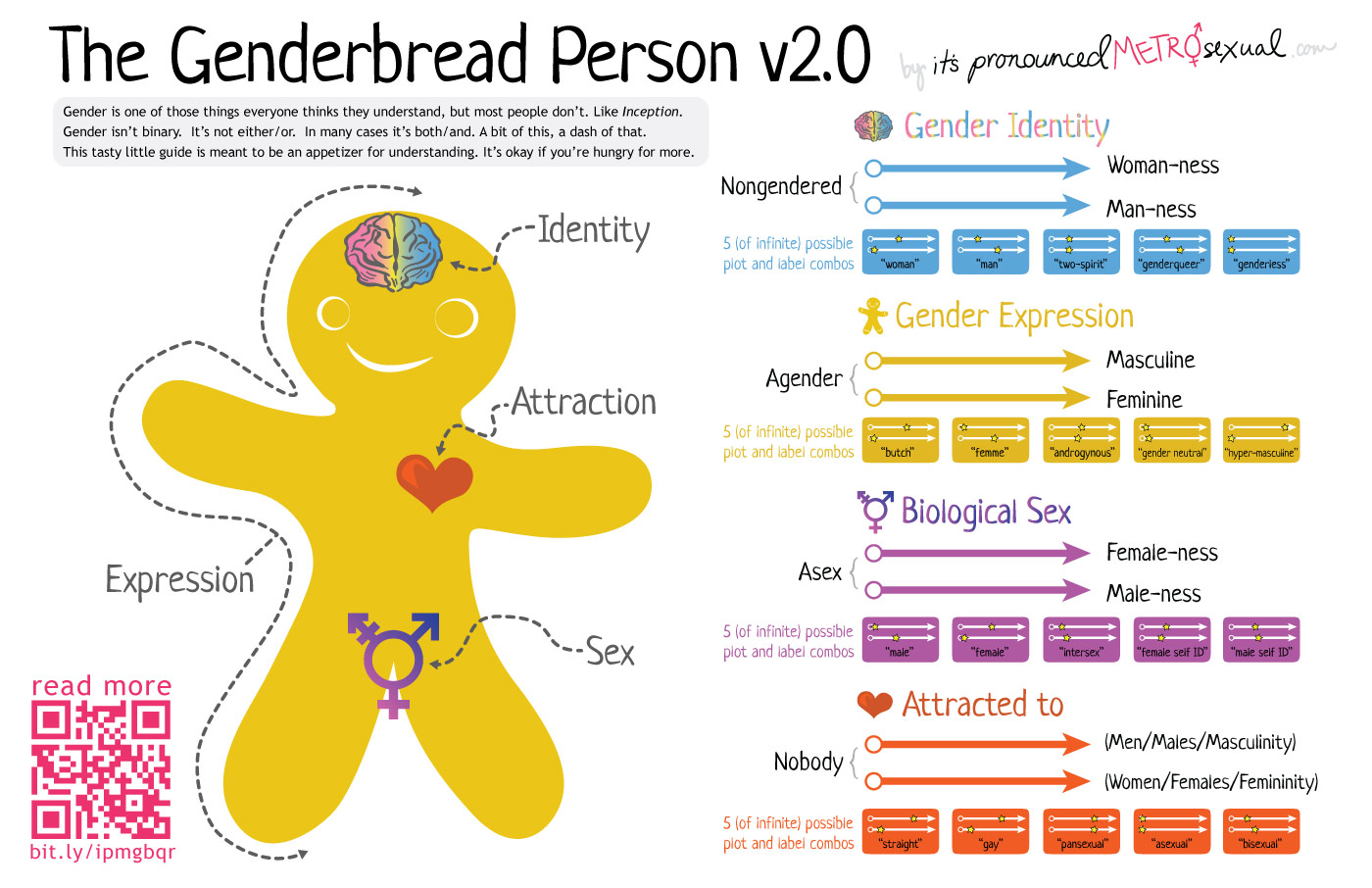The following is a contribution to the Faith of the Theologians series, to which I am honored and humbled to add my voice….
On hearing it, many of his disciples said, This is a hard teaching. Who can accept it?” . . . From this time many of his disciples turned back and no longer followed him.
“You do not want to leave too, do you?” Jesus asked the Twelve.
Simon Peter answered him, “Lord, to whom shall we go? You have the words of eternal life.”
This scene from John 6 has long been one of my favorites of the gospels. While one could easily read it as one of the passages where Peter demonstrates his great faith and devotion to Jesus, I’ve often imagined these words being spoken with a shrug of the shoulders, a bit of resignation and even weariness—as in, “Yeah, sometimes we want to leave you. But really, where else can we go?”—and I can sympathize. But I’ve also come to know and believe in a God who is the Love that will not let me go, despite myself.
Faith has never been something easy for me—perhaps because it has always been a question, from as early as I can remember. My parents were both Catholic when I was born and I was baptized as a young infant, but by the time I was two and my younger brother a few months old, my mom—who is by nature a faithful and spiritually hungry person, one of the “pure-of-heart”—was desperately searching for a deeper experience of community than she was able to find in the local Catholic church. A friend invited her to a women’s Bible study at the Church of Christ, and that very low-church Protestant congregation was not only the only faith I knew but also an essential part of my childhood—potlucks and playing outside after Wednesday night Bible study, Vacation Bible School and memorizing the books of the Bible and singing (acappella) hymns—it was like my extended family. Dad never came to church with us, though, and even as a small child that raised questions: maybe you don’t need church to be a good person – why are there so many different churches – where is God? The questions only deepened as I grew older and the problems of legalism and biblical literalism and anti-intellectualism (and the exclusion of women from any role in public worship) began to feel larger than my connection to the community. Going away to college brought both a freedom to explore other religious options—including a rich and formative experience of community in a non-denominational house church with a female pastor—and the opportunity to think deeply and critically about faith as a religious studies major.
So faith was never easy, never quite comfortable, but it was always there—God’s calling, alluring with love and beauty but also with and through human weakness. I hope that I’ve learned a bit of humility over the past ten or fifteen years, but I’ll admit, I was a pretty proud person when I went to graduate school in my early twenties. If I would have claimed any “faith” at all, it would have been something very “Jesus-as-ethical-teacher-y,” something that made good rational sense, with a healthy helping of feminism and political liberalism and a touch of Marxism for good measure. But in those first few years in New Haven, I experienced a string of relationships and personal events that both re-opened old wounds of rejection and cut new ones—and somehow, in that space of brokenness, God became real in a way that God had never been real to me before. Sometimes, alone in my apartment, I would feel the weight of a presence that would bring me to my knees and move me to tears—not the tears of anguish that I had cried the night before, but tears borne of the surprise of love, unexpected, unexplainable, and undeniable.
I was blessed with several friends who were able to share these experiences of both brokenness and joy, and with them—daily, in what is now called the Nouwen Chapel at Yale Divinity School—I began to pray, to really pray, believing that I was not simply rehearsing my intentions but speaking with (and listening to) someone who heard. I had several noteworthy experiences with a charismatic church in the area–and though it offended every rational bone in my body, there was a passion and presence of God there that taught me to open my hands and heart and admit that God was immeasurably more than anything my mind could make sense of.
As I continued to search for a community to call home, I began attending St. Thomas More (the Catholic Chapel at Yale), and even without receiving the Eucharist, I felt nourished by the liturgy there in a way that continued to draw me in. I was drawn to the kindness and peaceful centeredness that I observed in the lives of many of the Catholic people I knew (including my dissertation advisor, Margaret Farley). I was drawn to the spiritual traditions and social teaching of the church, and even more to the lives and writings of those who drew inspiration from them, such as Dorothy Day, Thomas Merton, and Henri Nouwen. I was confirmed in my Catholic faith—and my baptism—at the Basilica of the Sacred Heart at Notre Dame while I was teaching at St. Mary’s College in 2010. So it’s been quite recently that I’ve come to see myself as a Catholic theologian at all. In that time, I’ve continued to struggle with many things, both within me and outside. But I have faith and hope in God, like the ground beneath my feet, and I believe that even though I can’t see the whole picture God has called me to be and to do just as I am…
At some level, I envy those with deep roots in the tradition and an uninterrupted sense of religious identity and belonging. But at a deeper level, I believe that my journey is also my call: my ability to see God’s providence in my wandering, my hybridity, and my questions is also an essential part of the gospel truth that I am able to share with students as I share in their own questions and wanderings and hybrid identities. I may never feel completely at home in the Catholic church—or any church, for that matter. But to Peter’s words I can add my own—Lord, where else can I go? I’ve tried looking elsewhere. But it is in you that I find life—and life abundant. I believe and know that you are the Holy One of God.
For reasons that may be obvious but which also go beyond what I’ve written here, I’ve come to feel a certain spiritual kinship with St. Augustine. In honor of his feast day this week, I conclude this reflection with words from his Confessions that ring true with the cry of my own heart:
Late have I loved you, O beauty ever ancient, ever new—late have I loved you! For see, you were within me, and I outside; and I sought you outside and in my unloveliness fell upon those lovely things which you have made. You were within me, and I was not with you. I was kept from you by those things, yet had they not been in you, they would not have been at all. You called and cried out to me and broke open my deafness; you sent forth your light to shine upon me and chase away my blindness; you breathed your fragrance upon me and I drew in my breath and now I pant for you; I tasted you, and now hunger and thirst for you; you touched me, and now I burn for your peace…





That was beautiful, Jessica. Thanks so much for sharing your story.
I, too, am a Catholic theologian (newly-minted!) that entered the Church as an adult (albeit at age 19). I wonder how many of us there are! Thanks for sharing your story. Thanks for sharing your story!